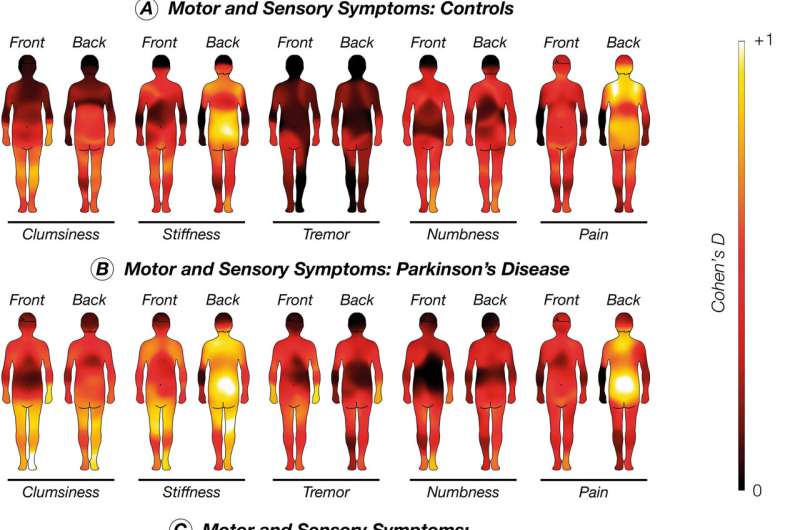This article has been reviewed according to Science X's editorial process and policies. Editors have highlighted the following attributes while ensuring the content's credibility:
fact-checked
trusted source
proofread
Stirring up emotions: Parkinson's disease alters emotion-related bodily sensations, finds study

Researchers at the University of Turku and Turku University Hospital in Finland have shown that bodily sensations related to emotions are altered by the neurological disorder Parkinson's disease.
Emotions have a major impact on the way we act, and they regulate our hormones and many of the body's vital functions. Emotions can also be associated with strong physical reactions and sensations, such as an increase in heart rate and blood pressure when a berry picker encounters a bear in the woods or butterflies in the stomach when going on a first date. Emotions are also reflected in the symptoms of many neurological and psychiatric disorders, with negative emotions in particular disease
Parkinson's disease is a neurological movement disorder that is characterized by motor symptoms, such as slowness, stiffness, and tremor. Parkinson's disease is also associated with a number of non-motor symptoms, such as depression, anxiety, and dysfunction of the autonomic nervous system. Dysfunction of the autonomic nervous system has influence, for example, on the blood circulation and gastrointestinal tract function.
Doctoral Researcher and physician specializing in neurology, MD Kalle Niemi, and his colleagues investigated the bodily sensations of basic emotions (anger, disgust, fear, happiness, sadness, surprise, and neutral) in Finnish Parkinson's disease patients.
The research article, "Bodily maps of symptoms and emotions in Parkinson's disease," was published on 8 April 2024 in Movement Disorders.
The subjects were asked to identify their symptoms and bodily sensations associated with different emotions by drawing them on an electronic human body map using a computer mouse.
People with Parkinson's disease were found to have significant differences in all bodily sensations related to basic emotions when compared with the control subjects. The differences were most pronounced in the bodily sensations of anger, which in healthy people are focused in the chest area.
In people with Parkinson's disease, the bodily sensation of anger in the chest was reduced and seemed to shift more to the abdominal region as the disease progressed, consistent with the dysfunction of the autonomic nervous system associated with Parkinson's disease.
"In recent years, there has been a growing realization that the non-motor symptoms of Parkinson's disease have a significant impact on the patients' quality of life. The results of our study highlight yet another non-motor phenomenon," says Niemi.
Emotional abnormalities are common in psychiatric disorders, but this study is the first to show abnormalities in the emotion-related bodily sensations in a neurological disorder. The results may open up new perspectives into the symptoms and possibly even treatment of symptoms in neurological disorders.
"The results of our study raise many interesting questions about the role of emotions in the symptoms of Parkinson's disease. Extending our research method to other diseases offers new possibilities for neurology research," says Juho Joutsa, Professor of Neurology at the University of Turku and principal investigator of the study.
More information: Kalle J. Niemi et al, Bodily Maps of Symptoms and Emotions in Parkinson's Disease, Movement Disorders (2024). DOI: 10.1002/mds.29785




















